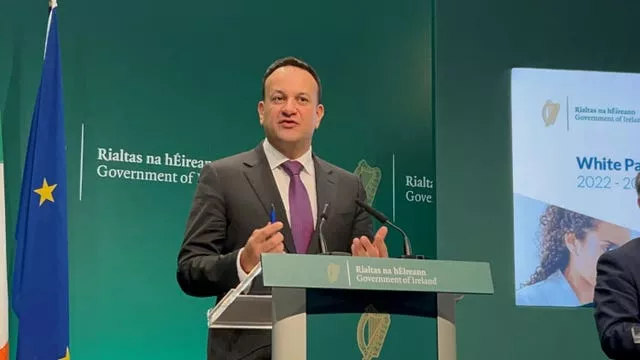The Government will have to extend some of its financial supports for businesses and households due to the high cost of living, the Enterprise Minister has said.
Leo Varadkar said consideration would be given to whether the 9 per cent VAT rate, the Temporary Business Energy Support Scheme (TBESS) and the excise cut on petrol and diesel would be extended past their February 28th end date.
His remarks were made as he launched the Government’s White Paper on Enterprise, outlining Ireland’s ambition for a green and digital economy up to 2030.

The Government announced a raft of measures in the Budget in October aimed at mitigating the effects of the increased cost of living on businesses and households.
Many of the measures do not come into effect until January 1st.
“There’s still two more energy credits to be provided, to be deducted off people’s bills,” the Tánaiste said.
“The student rebate will happen in the next couple of weeks. In January, people will see increases in pensions and welfare, reductions in income tax, reductions in the cost of childcare. So there’s still a lot to be seen, a lot to be felt in people’s pockets.
“But in the new year and certainly before the end of February, we’ll have to review the position because a lot of help that we’re giving people and businesses is due to end at the end of February, whether it’s the 9% VAT rate or the TBESS scheme for business, or the excise on petrol and diesel.

“And I think everyone understands that we can’t extend all of those things, but at the same time, with cost of living so high, I think some of them will have to be extended. We’ll work that out in the new year.”
The White Paper was approved by Cabinet ministers on Wednesday.
It aims to protect Ireland’s economic position, and respond to the challenges and opportunities that have emerged as a result of the pandemic, the wider economic and geo-political developments, digitalisation and an increased urgency to decarbonise industry.
It was devised following a review of enterprise policy conducted earlier this year, which included public consultation and engagement of an international advisory panel of expects.
Mr Varadkar described the White Paper as a plan of “adaption rather than an abrupt departure” from the Government’s current approach.
“It’s very much a case of evolution rather than revolution,” he said.
“Our vision, as articulated in the White Paper, is to enable Irish-based enterprise to succeed through professional advantage founded on sustainability, innovation, productivity, delivering rewarding jobs and livelihoods.”
The document commits to a 20 per cent increase in IDA (Industrial Development Agency) Ireland client spending by 2024. It also aims to have half of all FDI (foreign direct investment) investments between 2021 and 2024 located outside of Dublin.
The White Paper commits to a Research and Development target of 3.5 per cent of GNI (gross national income) by the end of the decade.
It also sets a 2.5 per cent average annual growth target in Irish-owned enterprise productivity by 2024, as well as a 50 per cent increase in the number of large Irish exporting companies by 2030.
The White Paper on Enterprise approved by Government sets out an ambitious vision for Ireland’s enterprise policy to protect our strong economic position and respond to challenges and opportunities as a result of the pandemic, and wider economic and geo-political developments. pic.twitter.com/34tyom0ovT
— Leo Varadkar (@LeoVaradkar) December 7, 2022
“As we go through the documents, there are very specific targets. They’re measurable, they’re achievable, but they’re also targets against which we can be held to account,” Mr Varadkar told reporters.
He added: “I do think they are realistic. They are ambitious. There’s no point having targets that are unachievable. There’s no point in having targets that are too easy to achieve.
“So we kind of said that they needed to be measurable, and that they needed to be both achievable and realistic, and I think they are.”







